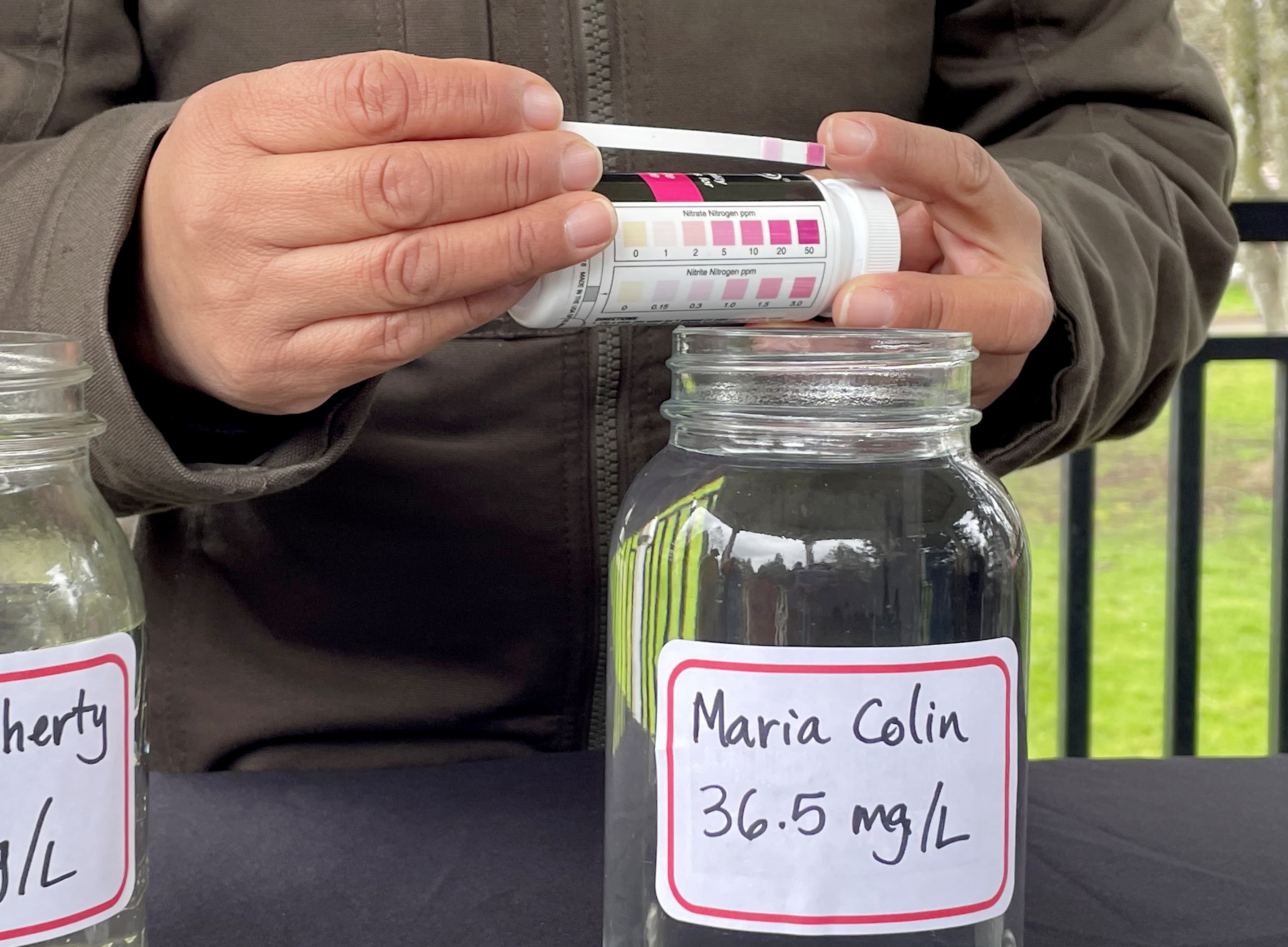
Oregon Rural Action's Ana Maria Rodriguez conducts a rapid test on a jar of water brought from Boardman, OR., which tested above the federal standard of 10 miligrams per liter.
Monica Samayoa / OPB
By suing some of the largest agricultural producers in the Lower Umatilla Basin, a group of local residents are trying to get the federal courts to do what they say state government has failed at for the past three decades: take decisive action against nitrate pollution.
But as he considered Tuesday whether he should allow the lawsuit to move forward, U.S. Magistrate Judge Andrew Hallman said the court was moving into new waters.
“There is no roadmap for this type of case,” he told the parties assembled at the federal courthouse in Pendleton.
There were so many attorneys in the small courtroom above the Pendleton post office that some sat in the jury box. Even if there wasn’t a lot of precedent to lean on, lawyers for both sides made their case for why Pearson v. Port of Morrow should be heard by the court or be thrown out entirely.
The attorneys argued over the legal definitions of irrigation and pollution, but one of the core issues remained whether the federal court should exert jurisdiction in the case.
The defendants, a mix of agricultural and business interests in Morrow and Umatilla counties, said the state of Oregon was either already regulating or taking steps to regulate the sources of nitrate pollution, negating the need for court intervention. The area residents who brought the lawsuit said the state’s regulatory system lacked teeth and was ineffective, which meant the court needed to take action.
Nitrates in the region’s groundwater, which register in some domestic wells above the Environmental Protection Agency’s suggested safety limits for human consumption, have become an increasing point of tension between some residents of the Lower Umatilla basin and area farmers who apply fertilizer to grow their crops.
Attorneys on both teams had already written legal filings fighting over the significance of Oregon’s recently released Nitrate Reduction Plan. Although that plan might be relevant to the case overall, Hallman said, it wasn’t pertinent to arguments over jurisdiction. He asked both parties if they would consider a middle ground where he issued a stay on issues already being regulated by the state, like industrial wastewater permits, while letting the rest of the lawsuit proceed. Attorneys for both sides held their ground.
The defendants also accused the plaintiffs of a “shotgun pleading,” targeting five big players in the region — the Port of Morrow, Lamb Weston, Threemile Canyon Farms, Madison Ranches and Beef Northwest Feeders — while ignoring other potential contributors to nitrate pollution. Plaintiff attorney Steve Berman said it would be “inefficient” to target every farm and agricultural producer in the basin, but his team was considering adding a couple more defendants to the lawsuit.
Hallman said he would make a decision shortly after Jan. 1. That decision would act as a recommendation to a district court judge in Portland, who would take the case afterward.
In the meantime, the basin residents aren’t the only group trying to get the federal government to act.
Oregon Rural Action and Food & Water Watch joined several organizations from Washington, Iowa, Minnesota and Wisconsin in a letter sent Tuesday to the U.S. Environmental Protection Agency, encouraging federal regulators to use their emergency authorities to intervene in nitrate pollution around the country.
“Nitrate contamination and the harm it poses to human health demands a national approach and response in light of the growing prevalence of the problem and the patchwork of ineffective state strategies,” the groups wrote. “We request a meeting to discuss how EPA can address this widespread problem with a cohesive, coordinated response that reflects the scope and urgency of this national crisis.”
In a press release, the two Oregon organizations stated that the Nitrate Reduction Plan is insufficient to address the nitrates crisis.


